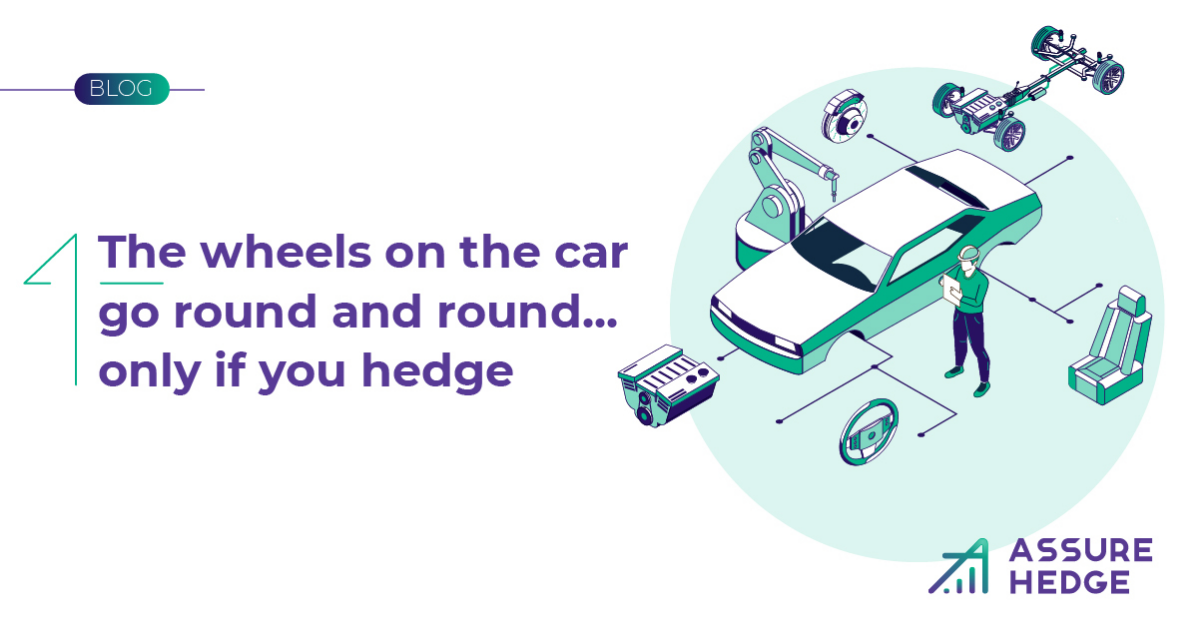
How much are you willing to pay for a car?
It’s a question car-makers are increasingly struggling with.
Over the past decade, the cost of driving a new set of wheels off the forecourt has increased five times faster than the average wage.
And with the price of raw materials skyrocketing — steel, for instance, went up a whopping 215% between 2020 and 2021 — the issue has become ever more pressing.
Faced with the stark choice of absorbing the increases and risk eye-watering losses, or raising prices further and losing customers, more and more car-makers are warming up to a third alternative: hedging.
Here’s a look at how rising costs are making things harder for the automotive industry, and why hedging is becoming a critical part of keeping their product affordable… and their profits in good health.
Cruising along peaks and valleys: why do commodity prices fluctuate?
The average car is 39% steel and 11% aluminium.
But as car-making technology advances, the list of required raw materials keeps growing.
Nowadays, most cars have computer chips, which are made of silicon and copper. Similarly, electric vehicles use copper to conduct energy from the battery to its other components.
Like oil, it’s normal for steel, aluminium, and other commodities to fluctuate in price. But the reason they’ve soared to unprecedented highs is down to a perfect storm.
As a rule, when demand is high and supply is low, prices tend to go up. And, during 2020 and 2021, every single thing that could’ve hurt supply happened all at once.
Consider steel.
Steel is forged from recycled scrap metal and iron ore. So, in order to have a healthy supply, you need:
- Workers
- A steady supply of scrap metal and iron ore
- People to transport the finished product to warehouses, where it can then be sold to car factories and other industries or exported
The same goes for other raw materials used in car production.
Copper and silicon have to be mined and processed. Likewise, aluminium is made from bauxite, an element that’s mined and then processed into the finished product by skilled workers.
Of course, with a highly infectious, potentially deadly virus doing the rounds, everything ground to a halt.
When the Covid-19 pandemic started in early 2020, demand tanked and factories scaled back production.
At the same, vast numbers of people were off sick or self-isolating. So there weren’t enough scrap metal workers or miners to supply raw materials, factory workers to make the finished product, or logistics workers to take it where it needed to go.
A year later, both manufacturers and consumers are chomping at the bit to make up for lost time.
Except manufacturers are having trouble ramping production back up again.
While lockdowns are (mostly) over, people are still catching Covid.
The pandemic has also been a moment of collective reflection. A huge number of people are reassessing their priorities, retiring to enjoy more family time and hobbies, or quitting their jobs to switch careers or work for themselves.
That costs HOW much?
While supply and demand have a big influence on the price of raw materials, and, in turn, the price of a car, they’re not the only factors that affect it. Inflation also plays a critical role.
Inflation is the rate at which purchasing power is decreasing. When inflation goes up, goods and services cost more. And that means your money won’t stretch as far as it used to.
So what’s that got to do with the price of fish… err, cars?
Let us explain.
There are two main types of inflation:
- Demand-pull inflation
- Cost-pull inflation
As the name suggests, in demand-pull inflation, customer demand drives up prices.
Imagine a utopia where everyone has a well-paid job and lots of extra money to spend. People are partying like it’s 1999, ordering off Amazon by the truckload, and building that garden extension they’ve been dreaming of for years.
It’s happy days for the economy, at least at first.
But if demand continues to rise, restaurants, pubs, and clubs may run out of capacity, Amazon sellers may struggle to fulfil orders, and contractors may be booked solid and unable to take on more work.
As supply dwindles, people are more willing to pay a premium to get served. So prices go up and inflation increases.
By contrast, cost-pull inflation happens when supply is low. This drives up production costs, which forces businesses to raise their prices.
At the moment, we’re experiencing a bit of both.
On the one hand, because raw materials and workers are in short supply, those available are more expensive. This means it costs more to produce steel, aluminium, computer chips, and other components. So, manufacturers have to raise their prices to make up for it.
At the same time, because the economy is reopening quickly, demand is increasing. Where, last year, people were being cautious with their money, they’re no longer putting purchases off.
The combination of high demand and low supply is causing inflation to go up. According to the UK Consumer Price Index, the cost of living had risen by 4.6% in November 2021. And in the EU, inflation was a slightly higher 5%.
Pressing the brake on inflation: how hedging helps car-makers control costs
Rising commodity prices are a headache for car-makers for two reasons.
As we’ve explained above, when raw materials cost more, they drive up production costs.
But what’s worse is the unpredictability.
Raw materials may cost X amount today, but could double or even triple in price a few months down the line. And if you don’t know how much raw materials are going to cost, you can’t be sure whether you’ll be able to turn a profit or be forced to jack up your prices.
Needless to say, customers are unlikely to take kindly to sudden price increases, especially when cars are expensive to begin with.
And that’s why hedging is such a powerful technique.
By agreeing to purchase X amount of a commodity — steel, aluminium, or copper, for instance — for a set price at a future date you can lock in a more favourable rate than what you’d get on the market.
This allows you to keep costs in check and budget more accurately.
And, more importantly, you can keep prices stable instead of shocking customers with a surprise increase.
Hedge away the sticker shock
The economy tends to go through cycles. There are periods of growth, followed by stagnation and rising costs.
And then it all repeats.
So while costs are soaring right now — and, chances are, they’ll continue rising for a while — things will eventually become more manageable.
In the meantime, hedging can make life easier for car-makers, and for their customers too.
Think on that next time you get behind the wheel.
Written by Barry McCarthy, Founder & Embedded Hedging, Assure Hedge
****
Hear more from Assure Hedge as FTT Embedded Finance & Super Apps on 26 April at the County Hall, London. Learn how access to FX hedging can now be delivered at scale to companies of all sizes.










